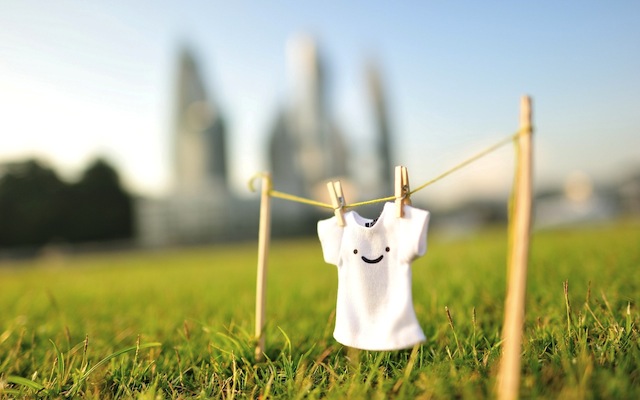
“The simple things are also the most extraordinary things, and only the wise can see them.” ~Paulo Coelho
As the day of my daughter’s second birthday approaches, I have found myself reflecting more and more on the first few months of her life.
She arrived on a Sunday morning as winter gave way to spring, full of life and ready to embrace her humanness as only a brand new human can. There was snow lingering on the ground, and the sunrise that day was full of anticipation and the unknowing that comes along with waiting for something that is impossible to predict.
We brought her home a few days later, unsure and anxious as so many new parents are, and settled into a rhythm that was punctuated with nursing, changing diapers, washing diapers, bouncing the baby to sleep, and waiting for her to cry so the pattern could continue.
It was a rhythm of trial and melancholy and immeasurable joy, somehow all rolled into one. As the cliché goes, having a baby changes everything.
I remember the first day I left the house alone to walk around a nearby lake. I remember feeling anxious that she would need to nurse while I was gone, and that my husband would have to deal with a screeching infant until my return.
I remember stepping around melting piles of grey snow and skirting mud puddles as I made my way down the driveway, out to the gravel road. I remember feeling the sun on my face and how good it felt to reclaim the use of my physical body.
I remember feeling like that walk—even with the mud puddles and drab weather—was enough to satisfy my need to feel alive and in my own skin, one human embracing her humanness, for the rest of the day.
I remember coming back into the house and melting back into the rhythm. I remember feeling like just being part of that rhythm was enough.
That feeling of contentment from having just one half hour alone, outside, moving over the earth on foot lasted for several months. I felt a sense of peace after coming in from a run, or time spent in the garden, or the occasional longer hike in the woods.
I went back to work full-time and started running or gardening in the morning as the sun came up.
Despite the extra demands that came with adding work to the rhythm of the days, that sense of peace—the sense that the ordinary rhythm of ‘life with baby’ was enough—lingered. For a while.
A few months after the baby marked her first birthday, I noticed that sense of peace slipping. I found myself wanting more time, more resources, and more flexibility to do what I wanted to do.
I found myself wanting to feel like I was making a difference, like I mattered enough, like I was enjoying enough. I found myself wanting to feel content with life and wanting to feel satisfied with the everyday. But I wasn’t.
Somewhere in the space between my daughter’s birth and her twenty month birthday, that sense of peace got stuck behind a different rhythm that felt busy and lacking and not enough.
A half-hour walk outside wasn’t doing it for me anymore. After coming inside, I wanted another half hour, and then another, and then another. Sometimes all the time in the world, all the recognition in the world, all the happiness in the world, it didn’t feel like enough.
I can’t say that I have completely regained that feeling of complete contentment. But as I reflect on the months just after my daughter’s birth, as her second birthday gets nearer, I reclaim some of that peace.
In acknowledging that feeling of lack, of discontent, and of happiness that comes and goes, I am inviting that peace to return to the rhythm.
It will undoubtedly still be a rhythm of trial, of melancholy, and of immeasurable joy, because that is what being human is about. It is about celebrating the mountaintops and accepting the valleys and their shadows.
It is about remembering that joy and peace remain present even when they seem buried beneath wanting, discontent and overwhelming schedules.
It is about seeing the extraordinary in something as mundane as a walk around a frozen lake on a muddy gravel road. It is about remembering that we are all full of life and have the capacity to fully embrace our humanness.
It is about recognizing the instinct to do something to change a feeling or the persistent need to address our desire for more—and letting it be there. Sometimes there’s simply nothing to do but accept that being human means letting all feelings speak, and then letting them pass when they no longer serve.
Perhaps embracing our humanness and the life that comes with it means celebrating the anticipation and the unknowing that comes with waiting for something that is impossible to predict.
Photo by bharatnow.net
About Heidi Barr
Co-founder of 12 Tiny Things, Heidi Barr lives in Minnesota with her family where they tend a large garden, explore nature, and do their best to live simply. Author of four books, she is committed to cultivating ways of being that are life-giving and sustainable for people, communities and the planet. Her next book, Cold Spring Hallelujah, will be released in November. Visit her at heidibarr.com












 Though I run this site, it is not mine. It's ours. It's not about me. It's about us. Your stories and your wisdom are just as meaningful as mine.
Though I run this site, it is not mine. It's ours. It's not about me. It's about us. Your stories and your wisdom are just as meaningful as mine.
nicely written!!!!!!!!!!!!!!I’m speechless you know sometimes you don’t like the thing that you you are doing but you have to do it right can’t help it. 🙂
I am reading Tiny Buddha articles almost a year, but this is the article written with so in depth message, it seems I have to read a few more time with cool head to understand it.
Thanks for reading!
Yes life can bring to us a space of ‘wanting’ even when we know all the book knowledge of being peaceful and happy. It is when we lose ourselves into the animated conceptual world that depletes our connection with our true selves, our pure nature of being at peace and mentally stable.
You put is well by saying “It is about remembering that joy and peace remain present even when they seem buried beneath wanting, discontent and overwhelming schedules.”
It’s all about finding ways to maintain that pure connection with our true nature. The nature that ‘lights up our daily living’.
Great Post Heidi & thanks for the pointer.
Neil,
Isn’t that the truth?! We can know intellectually what “needs” to be done to achieve the contentment that we want, but it can be so challenging to let the wanting go and let the connection to our true self take the reins. Thanks for your comment!
I have found that it is around this time period after having both kids, I was really “wanting something”. I interpreted it as ME trying to come out as a separate person again after that first year+ of being so physically necessary to the baby. Parenting has been constant change of stages for both kids and myself, realizing it and accepting it. The best little teachers. Great post!
I agree….it can be so tricky to reclaim that sense of self again as children evolve into little beings who can care more for themselves. Thanks for your insights!